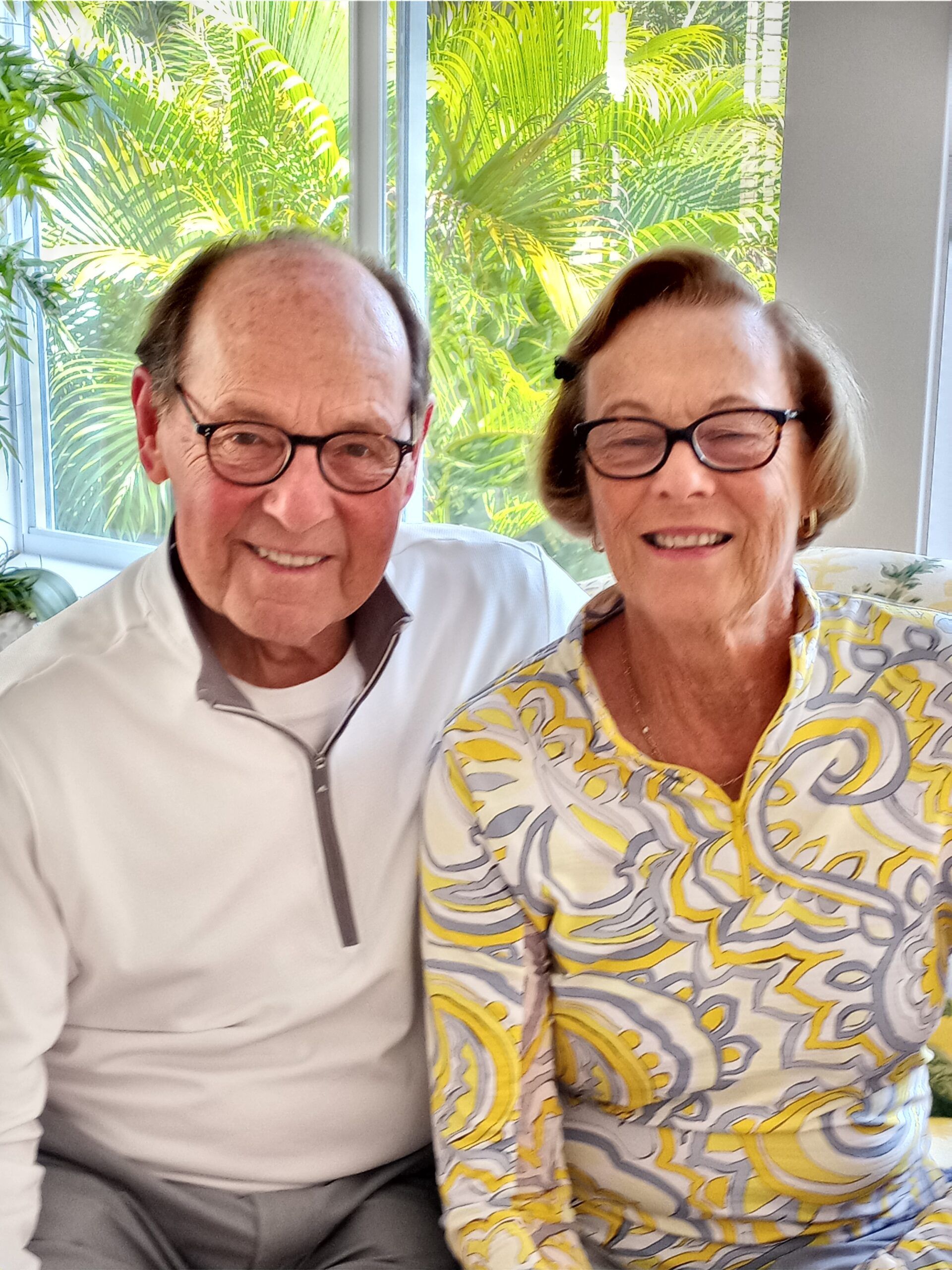IN THE SPOTLIGHT: Haiti deserves a break

Ben and Louise Scott are not preachers; they are business people. Ben was a very successful owner of multiple franchises with McDonald’s Restaurants until his retirement in 2001. They know who has been supporting their business success, however, and do not mind telling people. It is God.
Ben has even written a small book on the subject. It is called “Why & How Much Should I Be Giving to the Church, to the Poor? A Pathway to Holiness, A Gateway to Heaven.” It provides his perspective on “using your money to help assure your salvation…”
He goes on to say, “Oh, I know salvation can’t be bought; Jesus Christ already did that for us. However, have you ever thought about using your money in the way Jesus instructed us?” He uses his own awakening as the basis for sharing his thoughts in this book.
Ben knows people often don’t like to talk about such things, but he feels a duty to share his own experiences and help others find the fulfillment and peace he has found in the sharing of wealth.
Ben and Louise have been part of the Boca Grande scene since 1989. Ben was still working, their two kids were off to college and some friends had been to the island and suggested the Scotts check it out.
They bought at the Boca Grande Club in 1989 and built a “tree house” there.
“Our good friends were still working, so they couldn’t be there very much to take us around and introduce us, so we started making friends through our church — Our Lady of Mercy Catholic Church,” Louise said. “We were there (Boca Grande Club) nine or 10 years. Then we sold that, and decided we wanted to rent, because we weren’t sure where we wanted to be on the island. We knew we wanted to be here, but not sure just where. Ben was working so I would come down and stay and he’d come back and forth. We were down here for the whole winter. The church was a big force in getting to know people and being involved in the community,” she said.
At this time, the Scotts owned nine McDonald’s restaurants in and around Piqua, Ohio. Now their son Benny owns them and has even expanded the company to own 25 stores from Piqua to Dayton to Lexington, Kentucky. Ben Sr. made Benny work hard when he joined the company, but it proved beneficial, as the company is now doing very well. Ben Senior said his son is great with the numbers, the marketing, making a profit. “It has worked out very well,” he said. Their daughter Caryn lives and works in Cincinnati.
So, with the business in Benny’s hands, the senior Scotts could focus more on Boca Grande. They rented on the island for five or six years, staying in the north end. Then they moved further south, to Boca Bay, and rented there for a couple more years. Friends pointed out a spot that was just coming on the market. It was in Boca Bay’s North Village. Louise and Ben saw it and bought it.
It is the house they live in today, but there is a twist in the story.
“We bought the house in 2001, and then sold it four years ago,” Louise explained. “As it turned out, the couple who bought the house lives in France and couldn’t come very often.” They asked the Scotts if they would be interested in renting it. “Sure we would,” was their answer. “And here we are. This is our fourth year,” she laughed. So now they rent the house they once owned, staying from January through the end of April, which is pretty much the same schedule they have been on since they first came to Boca Grande.
The Scotts are originally from Toledo, Ohio, and moved to Piqua as opportunities with McDonald’s opened up. They still live in Piqua for the fall and early winter, and also have a summer home in northern Michigan.
“It’s a nice mixture for the different seasons,” Ben added. “And we have three sets of friends, some in each of the three areas.”
Church has played a big part in those friendships, as it has in the charitable work the Scotts do.
Their church in Ohio brought in a visiting priest who worked for Food For the Poor and made an impactful presentation about the work the organization is doing in developing countries.
“We liked the organization, so we started contributing,” Ben explained. “As time went on, we kept increasing, seeing the work they did. And then one year, probably in ‘07 or ‘08, they had a special project with the Nicaragua-American Foundation. They offered to do matching gifts: whatever you gave they would match. So at that time things were going very well for us in the business, so we thought we would get involved in a big way. We decided to buy 12 houses that would be matched by another dozen houses.”
After that, Food For the Poor invited Ben, along with other major donors, to go to the celebration in Nicaragua to see how their contributions were put to use, as well as to see the effect it had on the people they helped.
The houses were built as part of the development of a small village, with a community center, a church and homes for people who had been living in shacks, usually with mud floors, no running water and little protection from the weather or intruders.
For a couple of years before Ben’s trip to Nicaragua, a friend at Our Lady of Mercy had been after him and Louise to organize a committee to raise funds in Boca Grande for Food For the Poor. This man also raised money for the organization in his hometown in Illinois, and said he would serve on such a committee.
“I kept putting it off, but after I got back from Nicaragua, we decided to call some couples we knew who would be interested,” he said. About eight couples, from the church and the wider community, joined in. Then they rounded out the committee by making sure all the island churches and their top ministers were included in the group.
In 2009 they started planning, with the help of the Food For the Poor staff. The group scheduled its first fundraiser for February of 2010. Just before its kickoff, Haiti was hit by a devastating earthquake. It struck on Jan. 12, killing some 250,000 people, leaving the capital, Port-au-Prince, in ruins, and much of the country homeless.
“We had set a goal of $400,000, but we were thinking two, three, four or five years to build this village, and lo and behold, we raised all the money in the first year. It was unbelievable!” Ben said.
The next year, they felt they had to try this again. Today, the group has been raising money for 15 years in Boca Grande for the work of Food For the Poor. Ben said there have only been three years when the goal was not met.
They have continued the same building approach as that first effort in Nicaragua, with houses built in a community-type setting, and a church, possibly a school, a community center and sometimes a vocational training center included. They also build a water supply, often provide fruit trees to plant in each yard, sometimes a goat for each family to begin raising animals for milk and meat, and to sell. Louise pointed out that some of these villages have taken two years to complete. Food For the Poor continues to maintain and monitor the villages to ensure the people maintain the higher standard of living they obtain by having their new homes.
Ben admitted that some people have been concerned about the safety of their donation as violence has escalated in Haiti. He explained that Food For the Poor does not deal in “cash,” and has secure places for building materials and equipment. They have been helping developing countries for many years, so they have developed safeguards that protect the investments donors are making. He also said much of today’s building projects are in areas away from the capital, where the gangs and other violence tend to be centered.
Ben has been to Haiti almost annually since the Boca Grande program has been underway. Louise has been there less often, but has seen the work firsthand, as well. They have great confidence in the partnership and the infrastructure the organization has put in place to secure their efforts will have long-lasting beneficial effects in the countries they serve. Other committee members —Fr. Carosella and others — have also made the trip to Haiti to see the work being done.
“You don’t understand poverty until you see something like this,” Louise noted. “I had no idea. I have seen people in poverty, but never like they are in these villages. It was hard to see.”
Both she and Ben get choked up as they talk about some of the situations they have seen in Haiti.
Knowing that it is hard for many Americans to imagine the level of need in some countries, Food For the Poor has a professional videographer who goes on the donor trips to document the work and the need. Ben believes this helps tremendously in making his case with donors.
“It helps their trust,” he said.
The Scotts have started a similar fundraising program in Piqua, given the success of the Boca Grande efforts. It is on a smaller scale, but has still done a lot of good for the people of Haiti. The Ohio program includes their son Benny and his family, as well as others in the community.
The Scotts said the late Ray Kroc, the mastermind behind McDonald’s’ success, was a major influence in their decision to give at the level they do.
“We are fortunate, very fortunate,” Louise said, “and that’s what gave us our giving. I mean that’s what helped build our giving. How Ray Kroc really pushed that, how you are in your community and have to give back.”
Ben continued the thought: “We learned that from him, and he’s right and it’s the right thing to do. And we have all these McDonald’s restaurants throughout the world all doing the same thing, at least the ones I know about are. There’s always opportunity to help.”
He told of a shelter and soup kitchen in Piqua. It had its beginning from the Scott’s willingness to put their money where their hearts were.
“We just have to help them (the poor), that’s all,” Ben said. And then he points out the quote from Matthew’s Gospel, chapter 25, verse 45-46: “…Amen, I say to you, what you did not do for one of these least ones, you did not do for me. And these will go off to eternal punishment and the just to eternal life.”





